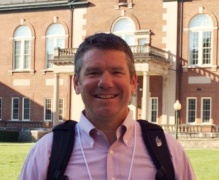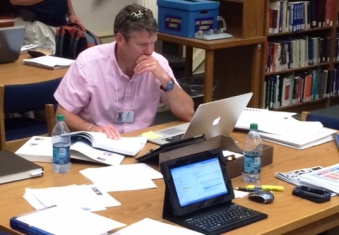— by Margie Doyle —
If anyone thought Kevin O’Brien was done learning now that he is Chief and Executive of the Orcas Island Fire and Rescue District, they’d have thought wrong.
This spring, O’Brien started a four-year course on Executive Fire Officer Leadership through the Federally-supported National Fire Academy. Back in late June from the two-week training session, O’Brien speaks enthusiastically of the challenges and opportunities of the highly-esteemed national program.
“A leader needs to keep pushing an organization forward, turning up the heat, so to speak, applying positive pressure, while at the same time monitoring the heat. Sustainable organizations encounter two core problems: technical changes relating to equipment , techniques and policy; and adaptive changes — changing people’s hearts and minds,” says O’Brien.
The course focuses mostly on adaptive changes because that’s where a leader faces the most challenge. And sometimes technical changes evolve into an adaptive challenges.”
Continuing to learn, says O’Brien, is part of our culture. The course is similar to a university fellowship; essay questions are required on the application process. The course, travel and lodging is funded by the Federal Emergency Management Agency (FEMA); the Orcas District pays only a meal-stipend for the time spent in Emmetsburg, Maryland at the National Fire Academy.
Successful completion of the program counts towards a Masters of Public Administration, in either Fire Service Leadership or Business Organizational Leadership. O’Brien, who has a Bachelor’s Degree in Political Science form the University of Washington, says, “If you think you’re ever “done” learning you’re setting yourself up for not giving your best. Higher education is food for the brain. And it’s rejuvenating — the world is changing and it’s critical for all leaders to learn what’s happening in the rest of the country and the world whenever you can.”
The first year of the program focuses on Executive Development: research methods, change management, organizational culture and change, ethics and service quality. Following the in-person coursework, the Fire Officer students are required to research and prepare a paper discussing a real adaptive problem in their own organization.
O’Brien has chosen to research the lack of reliable, sustainable after-hours urgent care on Orcas Island. He points out that even with Emergency Medical Technicians (EMTs) and professional medical providers, there is no formal 24-hour facility to address after-hours urgent care. This research “goes with our belief that we need to be proactive,” says O’Brien. He speaks of the high costs — to the patient, the system, the family and the jobs — of flying patients off-island when a doctor’s care is required, “and sometimes you just can’t get off-island.
“We’ve had Town Halls addressing the issue, and it’s still an important item to focus on.” O’Brien intends too present analytical data and also drawn upon the community to get the ground-level perspective.
The program’s second year zeroes in on community risk and fire and accident prevention; year three delves into emergency management; and the fourth year focuses on executive leadership.
“As a public steward, my job is to make sure we’re doing the best, most efficient, work; finding out the best practices, being out there in the world to learn.”
**If you are reading theOrcasonian for free, thank your fellow islanders. If you would like to support theOrcasonian CLICK HERE to set your modestly-priced, voluntary subscription. Otherwise, no worries; we’re happy to share with you.**










It is so impressive that you have chosen to continue your education. You’re off to a terrific start. Jim and I salute your enthusiasm and determination to continue the development of an outstanding department.
Yea!!!! for you! Merry
We are SOOOO lucky to have such a dedicated, caring Chief . . . AND Department!!!
A sterling example of inspired, visionary leadership. Thanks for your willingness to lead, Kevin, and for the hard work and sacrifice this entails.We’ll all benefit from your commitment.
Ditto to all of the above kudos for our Chief. Don’t let the … wear you down!
In response to the issue of after-hours urgent care, I’d like to pose the question of whether this relates to another lack: supportive care for our oldest seniors. If Orcas had a decent assisted living and/or nursing home facility, these folks could have around the clock care to help them maintain good habits–such as drinking enough water–that would prevent the crises that require being flown off-island. This also would help the island’s economy by providing year-around jobs.
Great work Kevin! OIFR and Orcas will benefit from researching the community’s medical needs.
For clarification: Orcas Medical Center has a physician on call twenty four hours a day/ seven days a week for evaluation and treatment.